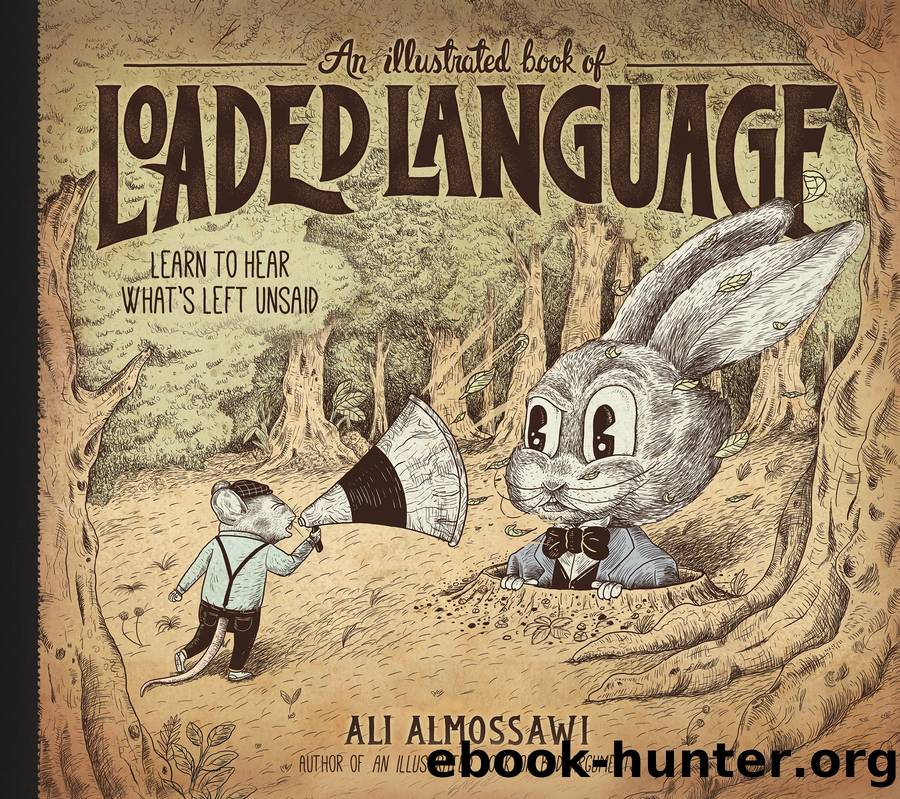An Illustrated Book of Loaded Language by Ali Almossawi

Author:Ali Almossawi
Language: eng
Format: epub
Publisher: The Experiment
Published: 2021-10-14T22:11:33+00:00
SEEING YOUNG RABBITS EXCITED ABOUT OUR SPACE LAUNCH WARMED MY HEART. THAT'S ONE LESS RABBIT ON A CORNER SOMEWHERE, WAITING FOR NIGHTFALL TO GO RAID A CARROT PATCH.
We find this kind of reasoning elsewhere, too: How we talk about a vaccine produced by a country can depend on which country it is, and if we like it or not. When someone alleged to be a spy is caught on foreign soil, whether that person is presumed guilty often depends on where theyâre from and where theyâve been arrested.
In a 2018 interview with a professor, we hear:
The fact remains that every rabbit walking around Mount Royal Park wearing a baseball hat is making a political statement. Not every cultural identifier is meant as an affront or statement to the world at large, professor.
Elsewhere, on the internet, beneath a polemic berating an author for being disingenuous, a commentor asserts confidently: This man is funded by the Hokey Pokey brothers.
âIs he actually funded by them in any way?â responds another, drawing the reply:
He certainly feels like exactly the kind of ghoul they would throw money at.
More perniciously, we can go so far as to define who is good and who is evil by identity alone. In the writings of a foreign minister, we find:
The prime minister and I underscored the importance of countering the Rabbit Kingdomâs malign influence and threats to the region. I thanked him for his partnership. But minister, one feels compelled to point out, you yourself spend much of your time in that same region in hopes of spreading your influence. Not that it has any bearing on whether the Rabbit Kingdomâs influence is good or evil, but the clear presupposition is that our actions are categorically good, and the same actions, by somebody we donât like, arenât.
Modern, civilized. Writing can adopt the perspective that other people canât be modern, often a euphemism for civilized, unless they dress like us, eat like us, speak like us, think like us, and so on. Thus, we make ourselves the yardstick for who is civilized, then dismiss other cultures as backward and inferiorâor perhaps as third world countries, as we saw a moment ago.
That is, unless they have something we really like, in which case we âcivilizeâ it by claiming it as our own:
Coffee . . . the favorite beverage of the civilized world.
Rodgers and Hammerstein grapple with the self-centeredness of this approach, even while arguably succumbing to it at times, in their musical The King and I. As the King of Siamâs wives are preparing to meet, and hopefully impress, visiting Western dignitaries, they wonder aloud why they must adopt the clear mistakes of their would-be civilizers: cumbersome hoop skirts and leather shoes that pinch. They can only conclude (as the song title puts it): âWestern People Funny.â
Interestingly this particular song is often cut from productions.
Defining normal. In a recent work of fiction, we find the following two lines:
How cruel that they punished you for something you cannot change.
We love you no matter what.
Download
This site does not store any files on its server. We only index and link to content provided by other sites. Please contact the content providers to delete copyright contents if any and email us, we'll remove relevant links or contents immediately.
Machine Learning at Scale with H2O by Gregory Keys | David Whiting(4313)
Never by Ken Follett(3956)
Harry Potter and the Goblet Of Fire by J.K. Rowling(3857)
Fairy Tale by Stephen King(3396)
Unfinished: A Memoir by Priyanka Chopra Jonas(3389)
The Man Who Died Twice by Richard Osman(3078)
Will by Will Smith(2919)
It Starts With Us (It Ends with Us #2) by Colleen Hoover(2367)
Rationality by Steven Pinker(2363)
Can't Hurt Me: Master Your Mind and Defy the Odds - Clean Edition by David Goggins(2341)
The Dark Hours by Michael Connelly(2307)
The Storyteller by Dave Grohl(2236)
Friends, Lovers, and the Big Terrible Thing by Matthew Perry(2230)
The Dawn of Everything: A New History of Humanity by David Graeber & David Wengrow(2208)
The Becoming by Nora Roberts(2201)
The Stranger in the Lifeboat by Mitch Albom(2121)
Cloud Cuckoo Land by Anthony Doerr(2112)
Love on the Brain by Ali Hazelwood(2078)
Einstein: His Life and Universe by Walter Isaacson(2022)
